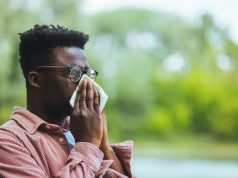Reduction in 22-item Sinonasal Outcome Test from baseline to week eight with verapamil hydrochloride
THURSDAY, Jan. 26, 2017 (HealthDay News) — For patients with chronic rhinosinusitis with nasal polyps (CRSwNP), the first-generation inhibitor of epithelial P-glycoprotein (P-gp; an efflux pump that is overexpressed in CRSwNP), verapamil hydrochloride (HCl), is associated with improvement in outcome measures, according to a letter to the editor study published online Jan. 23 in the Journal of Allergy and Clinical Immunology.
Marcel M. Miyake, M.D., from Harvard Medical School in Boston, and colleagues conducted a randomized placebo-controlled trial comparing oral verapamil HCl to placebo over eight weeks. Patients were followed up at weeks two, four, and eight. Eighteen patients completed the study: 10 from the verapamil group and eight from the placebo group.
The researchers found that from baseline to week eight, the least squares mean change in the validated disease-specific 22-item Sinonasal Outcome Test was −27.3 and 0.4 in the verapamil and placebo groups, respectively, resulting in a final difference between the groups of −27.7 (P = 0.01). The final least squares mean between-group difference in visual analogue scale score was −37.97 (P = 0.001). There was a significant difference favoring the verapamil group in the Lund-Mackay computed tomography score (absolute mean difference, −5.20; P = 0.02). The verapamil group also had a significant reduction in total Lund-Kennedy endoscopic score at week four (least mean squares difference of −2.8 between the groups; P = 0.003).
“Our data demonstrate that low-dose verapamil monotherapy is well tolerated by patients, with [fewer] side effects and lower costs than those reported in previous studies using biologic agents,” the authors write.
Several authors disclosed financial ties to medical technology companies; one author provided expert testimony on ENT-related cases, and has a patent for P-gp inhibition for chronic rhinosinusitis.
Full Text (subscription or payment may be required)
Copyright © 2017 HealthDay. All rights reserved.








